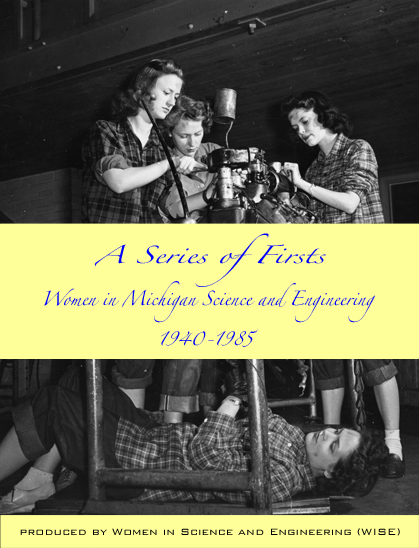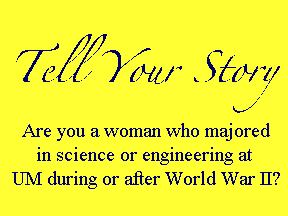Tenho Sihvonen Connable
Tenho graduated from the University of Michigan in 1942 with a Bachelor of Science in Chemical Engineering. She later earned a Master of Science in Computer Science from Western Michigan University. Tenho worked for Shell Chemical and Ethyl Corporation and then as a computer science instructor at Western Michigan University. She has four children.
Growing Up
Listen to Tenho describe her family.
TC: Both my parents came from Finland. They met in Detroit and were married. And let's see, they would have been coming over here before World War I. And like many immigrants they were very hard working and relatively poor.
KW: Did you have any brothers or sisters?
TC: Did I what?
KW: Did you have any brothers or sisters?
TC: I had one older and one younger brother (who is now dead). And also very close in growing up, sometimes within the same house but not always, were my mother's two sisters and their families. Both sisters were widowed.
KW: What kind of jobs did people have? What did your parents do for a living?
TC: My father was a tool and die maker, small dies. Most of my memory of his working was with Burrough's Adding Machine Company in Detroit. My mother did laundry for people. One of my aunts did cooking for families. The other friends, they were various...they did construction work and blue collar work.
KW: Did you know any engineers when you were growing up?
TC: No.
Listen to how Tenho's brother and father sparked her interest in science.
TC: Well, first of all, my older brother was a wonderful sibling. He was two years older than I was. Still living. He sort of pioneered the direction we were going. My father with his technical interest encouraged that and I was usually with the two of them doing things. I would note that my brother when he was in high school went to a co-operative high school, Wilbur Wright in Detroit, and from that had...they would go two weeks to school and two weeks of work. And he started with General Motors and as he went through school and college and things like that, still on co-operative plans, he eventually was working for Charles Kettering. I don't think that name means much to you but he is the reason why there was a General Motors. And he had a private lab with three engineers working and my brother was one of them.
KW: Did your family, as you were growing up, did they encourage you to pursue the sciences?
TC: Let's put it the other way. There was no dissent of my doing it.
KW: Well, that's good to hear. That's good to hear.
Listen to Tenho describe her high school experience including her first job and waiting for a U of M scholarship.
TC: I went to Goldberg Elementary School. And one of the shocks that I had when I went there was we had- I was born in 1919 and when the war ended and so it was about 1924 when I started school, kindergarten- and immediately, all my teachers seemed to refer to the fact that being Finnish was so wonderful because Finland was the only country that was paying their war debts. And also it made me feel very humble that I didn't see why I should be praised for something I didn't have anything to do with. And it made me very conscious of stereotyping. Well then I went to junior high and ended up at Northwestern High School in Detroit.
KW: What was your experience with science like in your schooling before U of M? Did take science classes in high school?
TC: Well, first of all I guess I was a good student. You don't know what people are like other than yourself as you're growing up. I made good grades; I was valedictorian. And also, it was wonderful, and there are things that slip me now, but Franklin Roosevelt started the New Deal, and I can remember I was able to work for one of the teachers doing book keeping, desk kind of work for him. And earned thirty-five cents an hour, and I remember how wonderful that was.
KW: Was that during high school?
TC: That was during high school. Then l was encouraged to try for scholarships, and I had visited the campus of the University of Michigan and had my heart set on going to Michigan. I remember walking through that beautiful law quad. I was awarded a scholarship at Wayne, and I knew I didn't want that. I didn't want to live at home. Then I got a scholarship to Michigan State, and I really wanted to go to Ann Arbor and I hadn't heard and I had to make a decision. And I gambled everything and said no to Michigan State and sure enough a U of M scholarship came.
KW: Oh well that's great.
Career and Family Life

Listen to Tenho describe her first two jobs after graduation.
KW: Well can you tell me a little bit about the jobs that you had then after...?
TC: Well I do refer to that and why I moved around so much in this paper. But my two basic jobs, and in three years obviously I wasn't there at either one very long, was with chemical engineering in San Francisco. Shell Chemical in San Francisco and Ethyl Corporation in Detroit. And with both those jobs I basically helped. I guess I would classify myself as a gopher, helped in studies for new products.
Tenho Connable, 19421
Listen to Tenho describe her family life including supporting her husband through school.
TC: Oh, I was married and I refer to that in this report I'll send it to you, and my husband went to law school.
KW: And you later got your master's, correct?
TC: Well, I helped put him through school, through law school. I worked for Badger, who was a retired professor from the engineering school. And I don't think I did very much really. I don't think I ever did very much in engineering. Then my husband, my then-husband- l had two marriages- came to Kalamazoo, I followed him. And I had four children inside of six years.
KW: Oh wow. Are any of your children engineers?
TC: No, but all four of my children have gone through graduate school.
KW: Wow, that is very impressive.
Listen to Tenho discuss how she became interested in computer science and soon began teaching it.
KW: Ok. Was that your last job then?
TC: That was my last job.
Advice
Listen to Tenho discuss the problem of women achieving a work-life balance.
TC: I don't know. Being a women isn't easy, because of physical bit. My daughter did everything. She's a professional working, has a marvelous professional husband. They both have always worked from graduate school on. They had three children. I don't know how a woman does that.
KW: Yeah, I wouldn't know how to balance all of that.
TC: I don't know. I did everything serially, which also meant I never even touched the glass ceiling. You really have give it to be a full-time professional person, you have to work full-time. I think it the most important thing of succeeding professionally is being taken under the wing of some mentor, who takes you along. And that's a matter of luck sometimes. You can search for the person, but you may not find them. And so I would suggest if a women decides to get married they discuss the children issue very carefully, and they discuss what the roles will be during those very difficult years.
Listen to Tenho talk about the importance of mentors.
TC: No.
KW: You wished that there maybe have been one.
TC: But I never really, as I said, l never felt that I...I never personally felt discrimination, and l was always happy for every door that opened for me. And my ambitions were perhaps slightly separate because I was always married with a husband who was a primary income person. And I was divorced in 1972, mutually agreeable. And I married, that was after 30 years, and I married the most wonderful man, and had 27 years with him. So, I've been very lucky. I would mention that the man I married, Alfred Connable, was Regent of the University of Michigan for 16 years.
KW: Yeah, I saw that. That's impressive.
TC: He was a great man.
1. Michiganensian, 1942, p. 57
Women In Science and Engineering
1140 Undergraduate Science Building
Ann Arbor, MI 48109
ph: 734.615.4455
e: umwise@umich.edu







